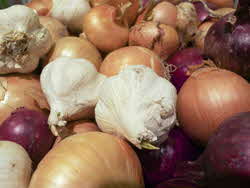GARLIC, ONIONS AND CANCER PREVENTIONDear EarthTalk:
Given the preponderance of carcinogenic chemicals out there today, is it true that eating certain foods like garlic or onions can actually help prevent cancer?
-- M. Stone, Boston, MA Natural healers have extolled the cancer-preventing virtues of garlic and onions for years, but only recently do we have enough scientific research to draw some conclusions. Several animal studies showing promising results using garlic and other members of the allium family (onions, leek, shallot, and chive) to prevent tumors have led to hundreds of studies involving human garlic eaters. While it is near impossible to pinpoint a direct link between garlic consumption and cancer prevention, the National Cancer Institute (NCI) reports that “several population studies show an association between increased intake of garlic and reduced risk of certain cancers, including cancers of the stomach, colon, esophagus, pancreas, and breast.” 
To wit, a multi-year study of 25,000 people from Switzerland and Italy found that those who ate the most garlic and onions were up to 88 percent less likely to develop various types of cancer (including cancers of the esophagus, mouth, throat, colon, breast, ovary, prostate and kidney) than those who said they ate little or none. “High onion intake, for example, was associated with a 56 percent lower risk of colon cancer and a 25 percent lower risk of breast cancer compared to no onion intake,” reports Karen Collins of the non-profit American Institute for Cancer Research (AICR). According to Collins, another study found a 32 percent lower colon cancer risk among Iowan women who ate at least one garlic clove a week compared to others who ate one once a month or less, while an analysis of several studies worldwide “linked a 31 percent lower risk of colon cancer with consumption of about four to five cloves of garlic weekly.” And the results of several studies conducted in China show that that those who eat five cloves of garlic a week are half as likely to develop stomach cancers than non-garlic-eaters. Meanwhile, AICR reports that isolated components of garlic have shown the ability to slow or stop the growth of tumors in prostate, bladder, colon, and stomach tissue.
Just how do allium plants prevent cancer? “Like many vegetables, onions and garlic contain antioxidants that can block highly reactive free radicals from damaging cell DNA and starting the cancer process,” reports Collins. “Laboratory studies have shown that onion and garlic compounds can increase enzymes that deactivate carcinogens in the body, enhancing our ability to eliminate carcinogens before they do any damage.”
Some researchers, however, say that study limitations—that is, the accuracy of reported amounts and frequency of garlic consumed and the inability to compare data from studies that used different garlic products and amounts—make a definitive declaration on the topic unlikely anytime soon. And without such definitive conclusive proof of a causal link, the U.S. Food and Drug Administration will not allow food purveyors to state the health benefits of the garlic in their products on their labels.
NCI would like to see better-designed human dietary studies using predetermined amounts of garlic to discern potentially effective intakes as well as more studies directly comparing various garlic preparations. “Given this protective potential, the challenge now is to identify amounts that will provide optimal effects,” says Collins. In the meantime, don’t skimp on the garlic and onions. CONTACTS: National Cancer Institute, www.cancer.gov; American Institute for Cancer Research, www.aicr.org 
EarthTalk® is written and edited by Roddy Scheer and Doug Moss and is a registered trademark of E - The Environmental Magazine (www.emagazine.com). Send questions to: earthtalk@emagazine.com . Subscribe: www.emagazine.com/subscribe; | 